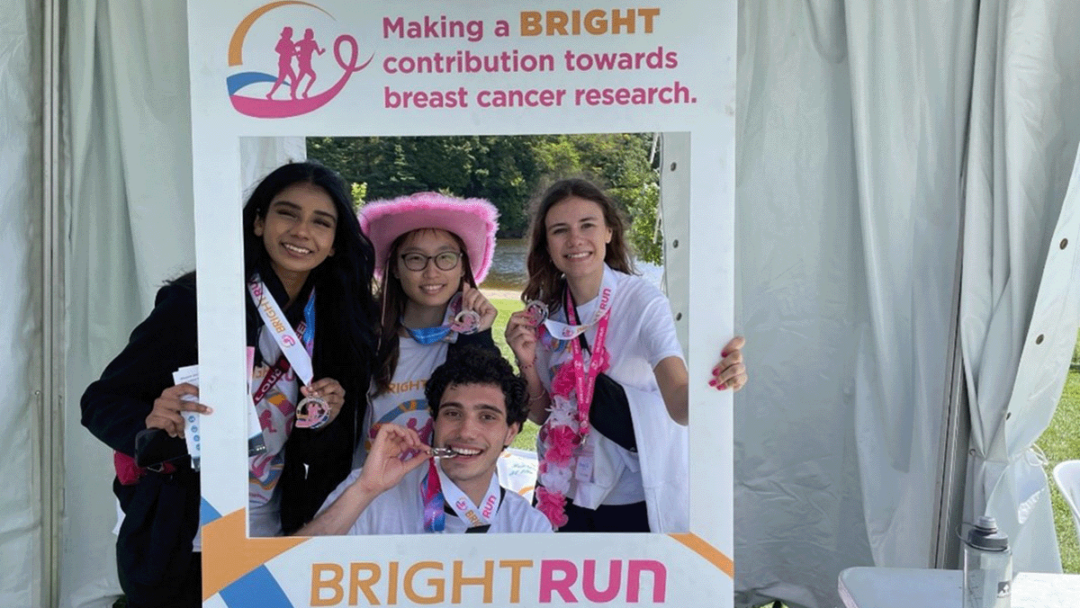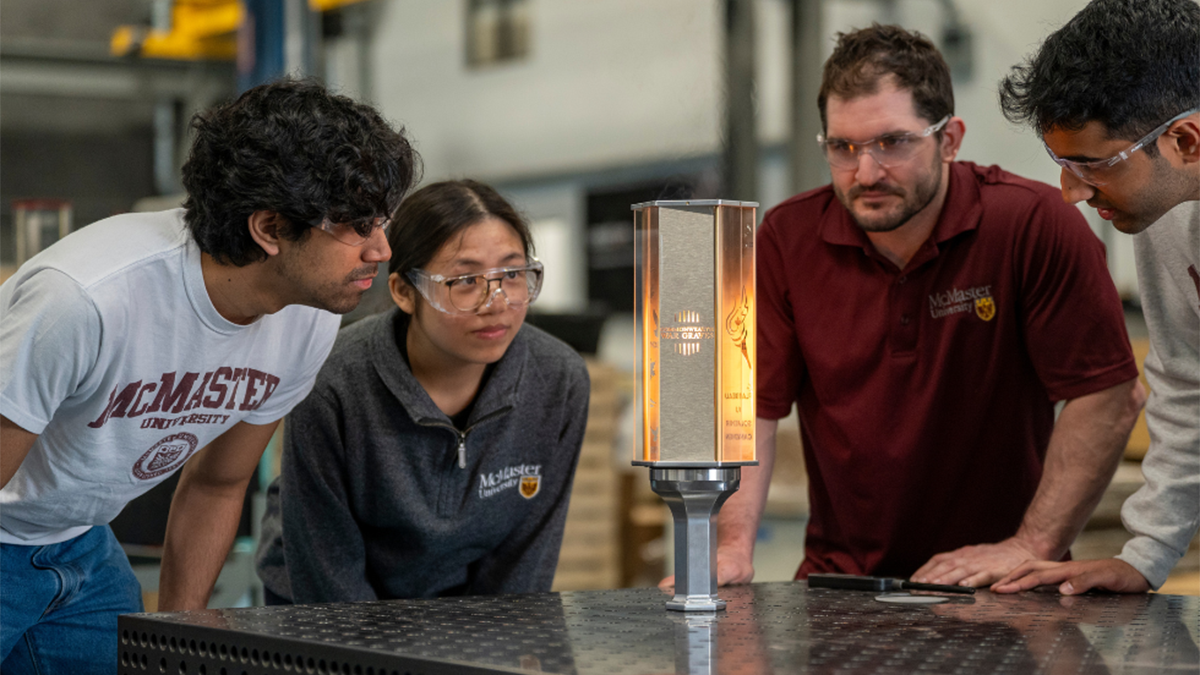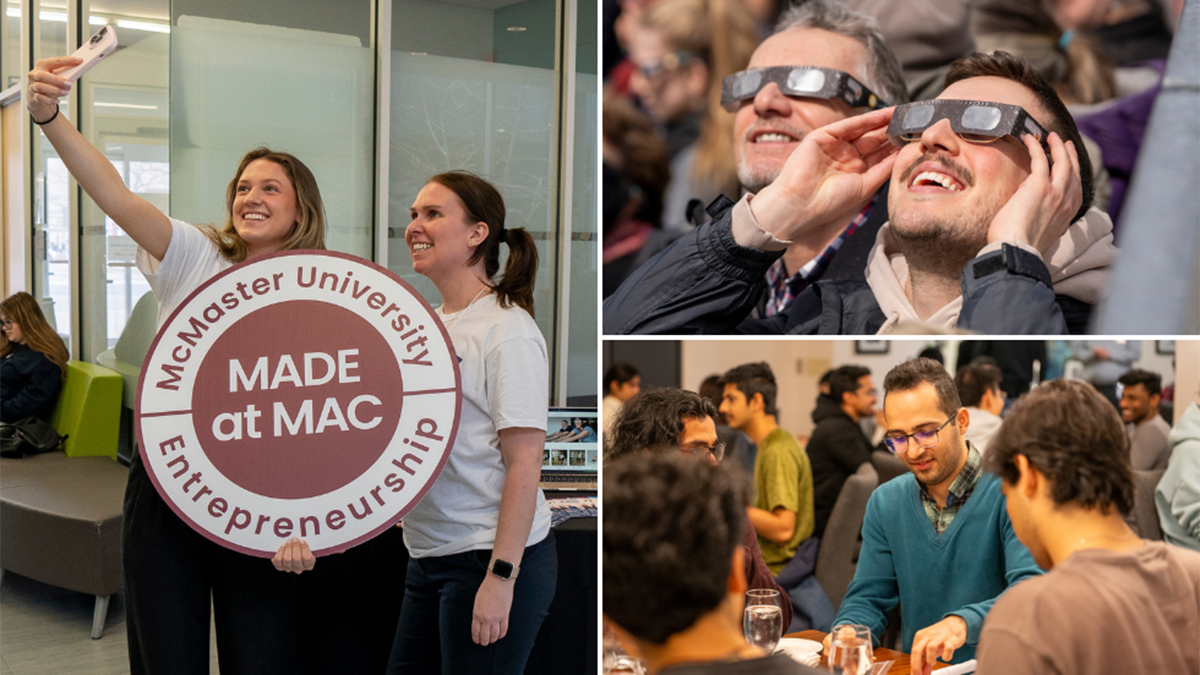McMaster students are working to beat breast cancer inside and outside the lab

A student-led synthetic biology team at McMaster University is making large strides in breast cancer research. In the lab, they’re creating a bacteria-powered delivery system for cancer therapeutics, while in the community, they’re raising money and support for local research efforts in the Hamilton area.
McMaster’s International Genetically Engineered Machine (iGEM) team is comprised of students from various backgrounds and disciplines from across the university. Their goal every year is to identify a problem and try to solve it using synthetic biology, which is like engineering, but for living things. Aiding them in this journey are principal investigators Jonathan Bramson, vice-dean of research with the Faculty of Health Sciences, and Tohid Didar, associate professor of mechanical engineering.
Their work is ambitious, and it could change our very perception of bacteria and how patients receive cancer treatment.
“Our current project is called Hermes, a bacterial delivery vehicle for breast cancer therapies,” says Chantal Luo, a fourth-year student in the Chemical and Biomedical Engineering program and the outgoing co-president of McMaster’s iGEM team.
“The goal is to make drug delivery more efficient while taking away the negative side-effects, particularly the off-target toxicity that usually comes with traditional cancer therapies.”
Traditional chemotherapy utilizes drugs that travel through the bloodstream to target cancer or a tumour. Excess treatment continues to circulate in the body, causing side-effects like nausea until it eventually makes its way out.
“We’re administering bacteria that is specifically engineered to latch on to a sugar that are over expressed on solid tumour cells. Once it latches on, it releases the drug. This reduces the amount of treatment casually floating around in the bloodstream.”
But the benefits of this engineered bacteria don’t stop there. Andrew Chami, outgoing co-president alongside Luo and a fourth-year student in the Honours Health Sciences Program, says because the bacteria is alive, it will continuously grow until the tumour is gone.
“Currently, if you provide a single administration of a drug dose, you’re going to get that one-time punch. But if you have something that’s constantly producing this drug, it will be more efficient and effective,” Chami says. “You don’t need as big of a dose at the beginning of treatment because you can expect that the bacteria will grow at the site.”
Aiming for gold in Paris
Some the world’s greatest athletes took over Paris this summer for the Olympic Games. While McMaster’s iGEM team won’t be running relay or breakdancing, they will be competing with Hermes as part of the International Genetically Engineered Machine Grand Jamboree.
This annual competition, slated to take place in late October, attracts other iGEM teams from universities and high schools from across the globe. Each team uses synthetic biology to tackle their own problem.
“We present our projects to judges and that’s how medals will be determined at the end of competition. Last year, we took home silver,” says Mya George, a first-year student in the Master of Arts in Health & Aging program. “You get to network and connect with other teams from around the world. There’s also a lot of industry members there as well.”
The McMaster team won silver for their project, which aimed to develop an ingestible biosensor to aid in the characterization of gut metabolites associated with major depression.
This year, however, the team hopes to capture the top prize and take home the coveted BioBrick Trophy.
“It has been a pleasure and truly exciting to collaborate with this dynamic and hardworking iGEM team. I am confident that the experience they have gained through their involvement in iGEM will significantly benefit them in their future endeavors,” Didar says.
Fighting cancer outside the lab
While the McMaster iGEM team has made incredible scientific strides in the lab, their contributions don’t stop there.
Over the summer, Chami, George and Luo took part in Bright Run, an annual fundraising event that benefits local breast cancer research projects in the Hamilton area.
To help raise money for the event, Chami hosted a sushi night, inviting friends to take part in a delicious meal and learn how to make the famous Japanese dish. With just a short period of time to gather donations, the team was able to pull together $300.
The experience was humbling for the group, as they walked and ran alongside many people who have personally been touched by cancer.
“It made it very clear that we’re not treating the monster that is breast cancer, but the patient who has breast cancer. That’s why when we are creating delivery mechanisms, we want to make sure we’re designing them with empathy and we’re designing with the patient in mind,” says Chami.
The positive experience has left the group wanting to do more, whether it’s the continued growth of their bacteria-powered delivery system or by raising more money next year for Bright Run.
“It’s one thing to read about the symptoms and challenges people go through when they’re undergoing cancer therapy. It’s another thing to be there running alongside people who have gone through that, listening to their stories and how it’s impacted them and their families,” George says.
The iGEM team is also focused on community outreach and smaller projects too. Members of the group are developing a comic book focused on CAR T cells – a type of immunotherapy used to treat certain cancers – to help people better understand the treatment.
“It is a pleasure to mentor these young people as they pursue their dream of developing novel therapies through synthetic biology. Their creativity and ambition is admirable and inspiring. These are exactly the types of young researchers that our university aims to foster,” Bramson says.
For now, the team is focused on the iGEM Jamboree, but hope to continue working on Hermes after they return from Paris.
“We’re planning for iGEM to stay here on the McMaster campus for as long as possible,” says Chami.
Community & Culture, ResearchRelated News
News Listing

Department of Medicine ➚
Pain to progress: An impactful history of lupus research and care at McMaster
Collaborations & Partnerships, Education, Research
2 days ago

3 days ago

